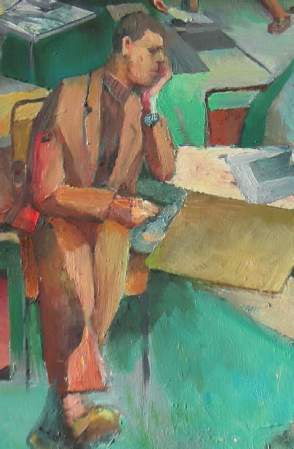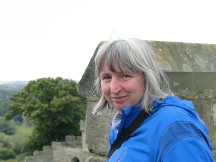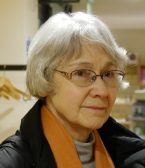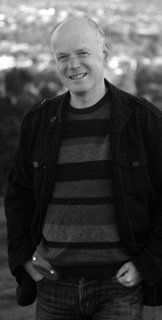

- Placeholder
‘I’ll come water-
I’ll gather magic hazel-
‘Dowsing,’ Dad says, and out in the shed
hang two copper-
of getting it into the head of
that knockroad bugger of a council man
that water does run under Jordan’s Land.
She’s let carry the rods,
Dad has the map, the pencil, the plan.
‘Can I go first? Please, Dad.’
He nods, ‘Reckon you can,
hold ‘em loose, mind.
Start at the rowan, I’ll find
the spot and mark it down.
Hushed, she treads buttercups and grass
in a hovering motion until,
ten paces on, comes the wonder:
a precursory quiver of oscillation, then
measured, irresistible pulling-
‘Where Alph the sacred river ran
Through caverns measureless to man…’
Bless me!
If we haven’t got a Water Diviner in the family,’
says Dad.
Often it is difficult to highlight the workings of the School of poets and illustrate all of the changes and deletions leading to the finished poem. This case is special. Only one change was required. The original title was, ‘Going with the flow’. Kate herself was not too happy with this.
Oh there's one more river, and that's the river (of) Jordan,
There's one more river, there's one more river to cross.
That sheep may safely graze,
unslaughtered, exempt from meat en masse
lingering in damp fields
until from faults inherent in their unevolved design
their wobbled teeth would drop out on the grass,
gives pause to grinding minds.
Natural selection never got beyond
the passing on of genes. To that point efficient-
perfected physiology, fit for purpose tail to teeth
evolved to court the nod of evolutioners.
Mammals birthed, suckled, passed on life and breath;
that done, went forth respectfully to predators.
Should aged sheep be fitted with falsers
to extend longevity and repair their faces?
They’d chomp the sunlit uplands
mended, tended by dental Mr Fixit
till with disappointment evident in grimaces
they’d herd and huddle through the next entropic exit.
Even Dolly, clever clogs, got cloned by vegan boffins,
exempt from butchering, her chops untasted,
was pretty soon abandoned by her blood and breed
her species and her phylum. At her paddock’s end
though safe from wolves, grieved for her woolly friends.
So third age ladies, gentlemen, abandoned by our bones
our purposes pets and proteges, go forth to our creators.
There’s more provision made for stones;
where ivy’d ruins in the middle distance
are picturesque at least, romantic in persistence.
Sue grew up in Birmingham. After studying maths at Bath University, went on to become a statistician and works in Edinburgh, writing computer programs and reports on the results of clinical trials. Her free time is mostly taken up with teenage children and volunteering at the Royal Edinburgh Community Garden. She likes to base her poems on short, true stories with a humorous twist!
The Sting in the Tale
Spring is in the air,
new love fills their hearts
with desire.
In a moment of lust,
he flings his underpants
towards the open window.
Their bodies are interlaced,
skin tingling against skin.
The sun streams in
and stirs the passions within.
Completely absorbed by
the heavenly moment…aaaah!
Then, a clinking of cups
stirs them back to reality.
Is her Dad bringing tea?
“Shit! Get back to the spare room -
that’s where Dad thinks you should be!”
He moves quickly but doesn’t see
what’s entered his pants.
The wasp gets a surprise too!
He muffles a scream
and faster than the speed of light,
faster than she thought a man could move,
he rips off his pants, and skips around.
“It’s not getting out of here alive!”
She laughs at him being mistaken for a flower.
Meanwhile, the clinking sound draws near…
Born in Edinburgh Cynthia grew up in East Lothian. After 30 years away she returned and currently works as a Spanish translator from her seaside home
In Mashhad we camped
for a week. I was afraid
only of giant ants
that clambered constantly
over limb and shank;
boredom broken by a bazaar sortie
where the hordes stared,
and I stoned their touch.
My head held high;
my pretty face, I now know,
as I gaze at an old photo.
Claustrophobia, how they crowded,
staring and invading my space.
I was in their space, that July.
Still unafraid, still unabashed;
at twenty, who would be cowed?
And the stones that I threw
were so small.
On my map
I look up Mashhad.
To the south "Plateau of Iran",
to the east "Afghanistan".
South east, along the border,
there lies Pakistan.
There went our cranky bus,
through tribal lands of Baluchistan,
through deserts, dirt track, and war.
At Quetta they watched us with guns;
without water we waited, and waited.
What crisis was this we had stumbled upon?
The World Service was guiding us on.
With skin of gooseflesh
and bowels of water,
the first fear drew near
like a noose of slaughter.
I had crossed a new border;
now August,
I had changed and was older.
More than three decades on,
I gaze at a photo of a girl who is young.
Wonder if she was me!
I remember the hordes
as they watched and touched.
I fear for the girl
on her border.
I’m invisible now,
free to see, only see.
And it seems a wild dream,
a Surreal imagining,
to have crossed
the tribal lands of Baluchistan,
Ignorant of map or politician,
free of defence or weapon,
with just youth and its beauty and joy,
and its fearless, innocent expression.
Our shed
through the arch
in the shade of the willow,
beyond the bird box on the old tree stump,
Dreams, honeysuckle, clematis and roses,
a dull, dark green;
when summer has gone,
and the roses, clematis and autumn have passed
our still cold shed stays;
and a dark spell descends.
A quiet winter spell
Sentinel shed
companion for birds,
our dull, dark green shed,
A shed for affection;
A poem?
A painting?
A part of our landscape.
Part of our childhood,
Part of our golden years
Nebulous
Real
without which
we would stand
bereft.
Shed culture!
Shed culture!
That dominant voice in the babble of words.
To spread or discard
or to muse on a life with no books and no art.
Shed culture and what will be left ?
Hewers of wood
drawers of water again;
no rhythms, descriptions;
we will never shed culture,
We will not!
We will not!
Then, a poem once chanced on,
Sheds and their culture;
spread culture
Well
I
Never
she thought.
He remembers how, with calculated will,
He’d kicked the stone and watched it rise predictably
to crack the glass that kept the pressure building
In that room the day his father up and left
And how he’d ran to set the wind against his hair
To feel the onslaught of his heart invade his ears
Along the scent trail of the only road he knew
Until the farm dog stopped him in his tracks
Erupting from the bowels of McWhirter’s yard
And streaking at him with a seasoned snarl.
He’d seen the flash of unknown history
Surging there behind the eye, its register
Of buried pain, and walked away,
Hot breath worrying at his heels.
Now as he wanders back through all the years
Towards the very spot he wonders still
If he’d have kicked that dog, had it been chained.
Acres, that is,
unmapped. A mistake.
Josiah and his mates
sent from the Survey
lost the place
charting a lake
In 1882, in November’s
cold wastes, and
with a taste of jerky
and beans and failure
to dog their days.
The fact remains
Centuries old trees
Were saved, waters
Could rise and drain,
Deer nibble, beavers
Play, loggers scracth
Their pates and say,
‘No felling here. Acres
Have gone astray’,
Later the State
Located them
Undesecrated
And magnificent.
I leave the comfort of the lodge,
Slide into snowshoes,
Slipping into a rhythm,
A slow shuffle through the woods
And in my head, melodies.
‘The Sound of Music,’ tempered with
The poetry of Frost, deciding whether
To chose the blue arrowed route
Or the yellow squared slope.
Behind me trees creak as
Snow cascades to the ground.
An avalanche of branches blocks the trail.
Stepping out of the dark. I push on upwards
Into the sunshine.
Cigarette in one hand,
drink in the other;
it's no surprise that
he painted with
his mind:
let abstractions
shape design.
Impounded on a throwaway island
at the dog end of empire,
it’s little wonder his canvases
encompass both proximity
and distance:
intricate lines shanghai’d
to surround riotous ideas.
Eventualities are delicately
balanced across the
full stretch of images,
all framed with
deliberate simplicity:
directing attention inward,
time and again.
Notebook in one hand,
pen in the other,
I stand then sit, beside then before,
these walls installed with their
uncompromising elements,
less paintings than fables
told by foundling children
of chaos and order who
refuse to repudiate
their unruly parents.
Drawn through a gauntlet
of impressionistic views,
effects infused with causes,
my waking moments are infiltrated
by brush-
fluid as oil poured on water,
purposes intoxicated
by process.
Ghosting along halls
devoid of windows but
busy as a museum with
insights waiting for
an audience.
Sunlight outside
trembles on the threshold.
The sun scratched out of the day a red of a distant burning,
bus headlights twitched on, the face that is no reflection looked
in, unable to influence decisions but the true receptacle of grace,
my guarantor should I dissipate in action and inaction,
but even he looked done, ready to travel home with me,
rather than cross the border, where I had once sought
resurrection, or love of a kind to seek continuance
in, eke out moisture carefully to see me through.
So in the end transfigured place, the survivors
of my unmet group of friends, family and familiar beasts,
the sharing of food, regular opiate of art
but which does substitute religion, would prove mineral
enough from an abandoned seam to mine, blacken me afresh.
So I turned with the weasel and out
of the wood, unlocked the oubliette of my flesh,
washed my soul down, shouted twice
to hear a kind of human voice again, to say
a prayer of sorts, asking intercession by our lost,
that the divine that subsists in all things restore me.
I had no regrets other than it was late in the day,
and travelled on, checking for my knife,
the notebook and pen, and those photographs
I always carry (but find hard to look at, even now).
Before I arrived, I called ahead, and someone
said they’d be there at the station, and I thanked them
without mentioning I had forgotten what meeting
was like, if it was just a thing of touch and kisses,
some bookend of friendship, or something more.
At the Cosmetic Counter at Boots
Shapes rose from the deep
into diamond-
and ice-
and mirrored
or miraged,
with colours unreal
poised hovering fish
lips waxed
not warning
the sweet bloodless blush
and could be
forbidding
and hidden
but smiling their welcome
don’t come,
do not go
below
sea anemones
lodged in the coral
and
full facing face-
the true consummation,
procuring;
the question that could not be passed
then the answer.
Transaction completed,
we drifted away,
with sweet scented oils
in bright coloured glass.
The advisory group had trouble with the implied transition from a coral reef to a perfume counter in the opening lines. This has still to be resolved.
The Greener Grass
They say the grass is greener
on the other side. But why?
For when I took myself there
I wouldn’t have said it was.
So I fixed to a fence post
a close-
to keep a watch after I’d gone,
But the grass stayed dull as ever.
Mum whinged ‘ It wasn’t natural’,
When I turned up the brightness.
2 am, He laughs now
to himself, face pink
as he trundles the zimmer,
the parquet living room,
open plan, giggles with him
as never before.
He’s on his way
to the downstairs loo again.
Two doors kept open, lights on
for ease of transport.
He laughs all the way there,
this man, my Dad,
and back again to bed,
as though he has saved up
all his joy for the end.


